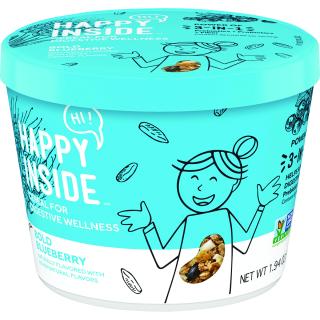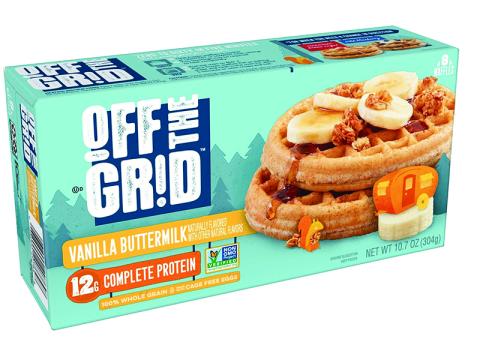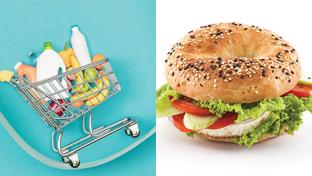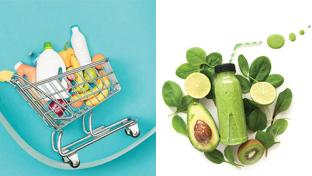Increasing Diversity of Breakfast Solutions
Key Takeaways
- People aren’t approaching breakfast the same way anymore, but they're still eating it, providing opportunities for grocers to grow this category across the store.
- Interest in healthier items has led to a proliferation of plant-based breakfast products; other consumer trends affecting the daypart are the rise of snacking, and inventive flavors and formats.
- Retailers shouldn’t neglect the prepared food department in their breakfast strategies, as the area can deliver excitement as well as convenience.
Is it a good morning for the breakfast category? As the saying goes, it depends on which side of the bed you get up on.
On the one side, people’s evolving habits and tastes are affecting traditional breakfast consumption. According to research from Chicago-based Mintel, half of consumers agreed in 2018 that breakfast is more important than lunch or dinner, down from 55 percent in 2014. Another recent survey, conducted by OnePoll UK in conjunction with White Plains, N.Y.-based hummus brand Sabra, found that the average American eats breakfast only three times a week.
On the other side, there’s a sunny side up to the a.m. meal: A report on breakfast trends from Geneva, Ill.-based flavor company FONA International showed that breakfast enjoys 91 percent positivity among consumers. Additionally, even as sales of some traditional items stagnate or decline, others are waking up, and the overall push for wellness and convenience is opening up new opportunities.
“While the morning meal occasion may not be as popular as it used to be, it’s still important from a wellness point of view,” points out Bill Bishop, chief architect at Brick Meets Click, in Barrington, Ill. “It’s also important because breakfast food is increasingly being eaten at all times of the day.”
Redefining the breakfast daypart

These concurrent trends can be taken in context together to underscore the ways that manufacturers and grocers can meet consumers where they are when it comes to breakfast, providing products, dishes and drinks that meet their needs for morning meals, or their taste for breakfast foods and beverages all day long. It isn’t as much about the elimination of breakfast as it is about the redefinition of this daypart eating occasion.
“Ultimately, finding future success in the breakfast market will require greater innovation that combines consumer focus on healthier food options with their need for portability and on-the-go breakfast products,” asserts David Sprinkle, research director for Rockville, Md.-based Packaged Facts, which recently released a report on the subject, “Breakfast: Retail Product Trends and Opportunities in the U.S., 2nd Edition.”
One indication of the evolving nature of breakfast comes from the American Egg Board (AEB). According to Phaedra Ruffalo, senior director, market development, for the Chicago-based organization:

“We used to have a section on our website called ‘Incredible Breakfast Trends’ that highlighted culinary and consumption trends focusing on egg dishes in the breakfast daypart. As we revised the platform with trendsetting chefs showcasing egg dishes and egg trend information based on the highlighted themes such as bowls, global cuisine [and] plant-forward, we realized these recipes were not just for breakfast, because of the versatility of eggs that could extend to all dayparts. We thus rebranded the platform to … ‘Incredible Egg Trends.’
"Egg dishes can come in so many different formats, such as with bowls, wraps, sandwiches [and] frittata bites, which all fit well in the breakfast daypart.”
New or redefined breakfast products and concepts can be invigorating for shoppers as well as CPGs and retailers, notes Bishop.
Breakfast & Wellness
While the adage about breakfast being the most important meal of the day may not be taken the same way it used to be, a morning snack, meal or drink that promotes some form of wellness is important to today’s consumers, who are searching for interesting foods that also meet their lifestyle and dietary needs.

One aspect of wellness is health, and to that end, providing healthy breakfast solutions is a strategy for broadening retail sales, both in store and in the ecommerce space.
“Additional segments to consider include consumers who increasingly prefer healthier options or have necessary or voluntary dietary restrictions,” suggests Michael Jaszczyk, CEO of GK Software, an omnichannel retail company in Raleigh, N.C.
An article published on breakfast trends earlier this year by Mintel emphasized the importance of healthy breakfast items, noting that consumers are looking for “healthy breakfast foods that are high in protein, contain fruit and are low in sugar.”
On that last note, the new Packaged Facts report on breakfast also highlighted the greater focus on low/no sugar or low/no added sugars. The report pointed out that sugar is a common ingredient in many breakfast foods, including cereals and breakfast pastries.
To meet the growing demand for lower-sugar items, manufacturers and grocers are offering various solutions. SweetLeaf Stevia Sweetener, for example, has introduced a line of Non-GMO Project Verified breakfast syrups in blueberry, cinnamon and maple varieties, made with the plant-based sugar alternative stevia and containing just 70 calories per serving.
“Stevia has become an important sweetener in the U.S. market because there is a desire for consumers to reduce added sugars in their diets, some for calorie reduction in order to manage weight, and others to prevent identified health risks,” observes Carol May, CEO of Gilbert, Ariz.-based Wisdom Natural Brands, the manufacturer of SweetLeaf products.
Breakfast in Foodservice-at-Retail Programs
In addition to items in the center store and refrigerated sections, grocers can deliver breakfast solutions to their shoppers through foodservice-at-retail programs. That approach is also an effective way to extend grocers’ own all-day sales.
The prepared food area is a key location that can accommodate breakfast solutions.
“Despite the prepared foods section of grocery stores being strongly associated with dinnertime, there is a significant opportunity for retailers to cater to morning meal occasions as well,” advises Hannah Spencer, foodservice analyst with Mintel. “A look at Mintel data on breakfast and brunch consumption by location shows that consumers are already purchasing popular breakfast foods, including breakfast sandwiches and smoothies, more often from retail than foodservice.”
According to Spencer, 57 percent of consumers already purchase prepared sandwiches from stores that sell groceries, and 27 percent currently purchase juices/smoothies, leading to a significant opportunity to tailor these prepared options for the morning daypart.
Steve Towarnicki, VP, CPG engagement for Dallas-based Symphony RetailAI, agrees that prepared foods and delis can be used better in the morning hours. “Many grocers are also using the deli pre-made section for breakfast options, leveraging the otherwise slow time of day for the section typically used for rotisserie chickens, sandwiches at lunch, and a variety of dinner options,” he observes. “By taking advantage of the deli, grocers can maximize the space in the morning, with products like breakfast sandwiches, breakfast burritos and home fries, giving customers options for an on-the-go breakfast alternative.”
For a certain segment of consumers, the dining experience at grocery stores involves more than just food choices. Phaedra Ruffalo, senior director, market development, for the American Egg Board (AEB), cites an AEB study showing that flavor and visual appeal are consistently important factors for today’s consumers.
“They want to be entertained; they want to be excited,” she says. “You’re seeing that with grocery stores, who know they have to excite consumers with different flavors but also keep that true comfort appeal.”
Generating such excitement is possible, adds Ruffalo, with menu ideas like a “walking omelet” that’s been popular on college campuses, or a waffle bubble cone, a warm waffle cone filled with scrambled eggs and other ingredients. “It’s still a breakfast profile, but with sweet-savory notes, and it has that visual appeal that consumers are seeking,” she points out.
Meanwhile, wellness is an umbrella term that also encompasses the concept of freshness.
The demand for fresh food at breakfast is another notable trend in the category, according to experts.
“Grocers and their CPG suppliers are adding more fresh-based ingredients as customer preferences shift toward fresher foods and cleaner ingredients,” notes Steve Towarnicki, VP, CPG engagement for Dallas-based Symphony RetailAI. “Retailers and CPGs are also meeting the needs of shoppers by introducing pre-packaged, fresh-ingredient meals that require only a few simple steps for preparation, like ‘just add water’ for oatmeal, or ‘add yogurt and blend’ for smoothies.”
Research from the Arlington, Va.-based Food Marketing Institute (FMI) bears out the flourishing interest in fresh, beginning with the morning meal or snack. According to FMI’s 2019 "Power of Produce” report, shoppers are consciously trying to consume more fresh fruits and vegetables across most meal occasions, an effort that has intensified since 2017. In particular, the report found that nearly half (47 percent) of consumers are trying to eat more fresh fruits and vegetables with breakfast.
Plant it Here
The takeoff of fresh food for breakfast syncs with the other general movement toward more plant-based eating. “Plant-forward meals are growing, and we see more restaurants that are incorporating more vegetables and grains on their breakfast menus,” says AEB’s Ruffalo, citing dishes like avocado toast topped with eggs, and the complementary combination of mushrooms, roasted tomatoes and eggs that imparts a fresh and umami flavor profile to quinoa bowls with vegetables topped with a poached egg.
Towarnicki points to the veritable explosion of plant-based brands like Beyond Meat and Impossible Foods that can affect breakfast consumption.
“A large number of fast-food chains, restaurants and even stadiums are now offering plant-based meat alternatives for all meal occasions, and grocery is no different,” he explains. “To accommodate this demand, grocers have had to allocate space on the shelf, reducing inventory for other categories that have either been over-allocated or are decreasing in popularity. For example, over the last decade, frozen juice sales have been in free fall, allowing retailers to reallocate the already limited frozen space to meatless, plant-based options across all meal occasions.”
In the breakfast category, Towarnicki notes the emergence of items like pork-less breakfast meat, plant-based smoothies and pre-portioned breakfast smoothie ingredients.
Many manufacturers, major companies and smaller, specialty and startup brands alike, are getting into plant-forward breakfast fare. Irvine, Calif.-based Before the Butcher offers an Uncut Breakfast Sausage patty as part of its line of plant-based meats. The Just Egg plant-based egg alternative from San Francisco-based Just Inc., made from mung bean, which is said to have the texture of chicken eggs, continues to gain in popularity: According to point-of-sale data from Chicago-based market research firm SPINS, Just Egg has captured 40 percent of the refrigerated liquid egg market in the natural channel.
Plant-based yogurts, including varieties from Chobani and Danone, are having an impact on the ever-expanding yogurt category.
Grocers have options for carrying heat-and-eat plant-based breakfast foods, too. Vancouver, British Columbia-based Daiya, for instance, recently added new plant-based breakfast burritos, made with an “egg-style” scramble, meatless crumbles and cheddar-style shreds, among other ingredients.
Sunrise Snacks

Another hallmark of the redefined breakfast eating occasion is the impact of the modern snacking culture. According to the recently released “Future of Snacking” study from The NPD Group, based in Port Washington, N.Y., indulgent snacking has been growing for morning occasions, when people tend to be on the go and looking for portability and convenience.
Several food and beverage companies are offing snack solutions that can be merchandised for breakfast. Westlake Village, Calif.-based Dole Packaged Foods, for example, has rolled out a line of Dole Spoonable Smoothie bowls that can be eaten as a snack or breakfast, or, for that matter, a snack-breakfast.
San Francisco-based Del Monte is also getting into this kind of hybrid product, with its Fruit Crunch Parfaits, nondairy parfaits that are rich in probiotics and packaged in a snack-sized 6.25-ounce cup. For its part, the venerable Tastykake brand, based in Philadelphia, now offers Muffin Juniors billed as suitable for breakfast or snacking.
New Flavors, Formats for Favorites

As manufacturers and grocers strive to distinguish their offerings in a competitive marketplace, putting the proverbial twist on breakfast classics is another way to engage today’s shoppers as they seek new experiences with just enough familiarity.
For instance, the egg segment includes newer formats, at least for grocery. “Egg innovation is expanding into various formats, from bite-size to wraps,” notes Ruffalo. “For example, we’re seeing the transition of sous vide egg bites from foodservice to the grocery store. Why? Because consumers are seeking more on-the-go breakfast offerings in formats that are easy to reheat and with a clean-label positioning with the use of real eggs. Overall, with these innovations, such as sous vide bites or egg wraps, these egg-based products create a fantastic carrier of flavor.”
One example of such a product is a line of all-natural sous vide egg bites from Brooklyn, N.Y.-based Les Trois Petits Cochons. The high-protein bites are available in Bacon & Swiss, Prosciutto & Gruyère, Ham & Espelette Pepper, and the vegetarian Spinach & Feta.

Other favorite breakfast foods have been elevated or updated in some way as well. The Battle Creek, Mich.-based Kellogg Co. introduced Off the Grid protein waffles earlier this year, offering 12 grams of protein and nine essential amino acids, and made with 100 percent whole grains and cage-free eggs. The longtime breakfast brand also is mixing it up in the granola segment with a new line of HI! Happy Inside granola featuring probiotics, prebiotics and fiber, aimed at improving digestive health.
Over Easy
Along with what items supermarkets offer shoppers, how stores deliver breakfast solutions is important for how retailers can optimize their breakfast products and programs.
“Breakfast, especially during the work week, is a notorious on-the-go action for many shoppers, so grocers should prioritize convenient items and an overall convenient shopping experience,” recommends GK Software’s Jaszczyk.
Going forward, that convenient experience should include the ability to quickly check out and pay in any part of the store, he adds.
“Consumers will always have their phone with them, but might not want to carry cash or bring their wallet when running into the store for a few items,” he explains, adding that fast and easy checkout options are available in different formats, including traditional checkout, self-checkout kiosks, mobile checkout via shoppers’ devices, self-scan, and click-and-collect for larger orders.








